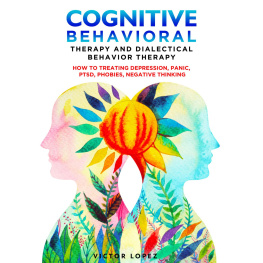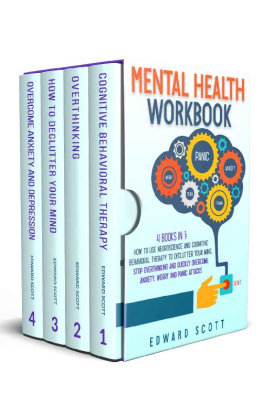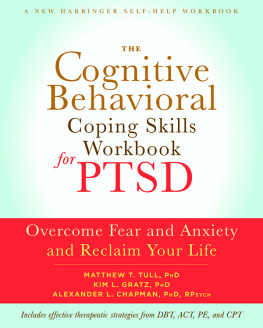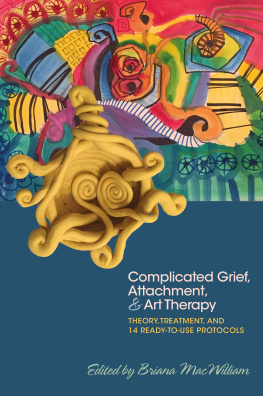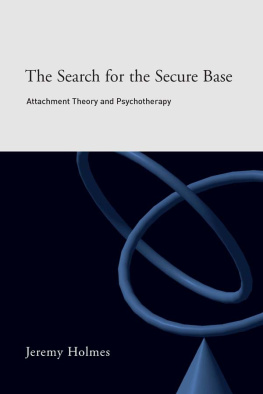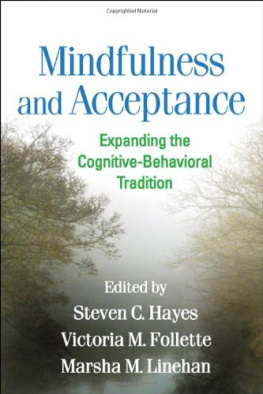MENTAL HEALTH
WORKBOOK
7 books in 1:
Attachment Theory, Insecure Attachment, Codependency, BPD, Cognitive and Dialectical Behavioral Therapy, Acceptance and Commitment Therapy
DAVID LAWSON PHD
Copyright 2020 by David Lawson PhD - All rights reserved.
The content contained within this book may not be reproduced, duplicated or transmitted without direct written permission from the author or the publisher.
Under no circumstances will any blame or legal responsibility be held against the publisher, or author, for any damages, reparation, or monetary loss due to the information contained within this book; either directly or indirectly.
Legal Notice:
This book is copyright protected. This book is only for personal use. You cannot amend, distribute, sell, use, quote or paraphrase any part, or the content within this book, without the consent of the author or publisher.
Disclaimer Notice:
Please note the information contained within this document is for educational and entertainment purposes only. All effort has been executed to present accurate, up-to-date, and reliable, complete information. No warranties of any kind are declared or implied. Readers acknowledge that the author is not engaging in the rendering of legal, financial, medical or professional advice.
TABLE OF CONTENT
Understanding Love Styles Attachment Styles In Romantic
Relationships
How To Make Great Friends Regardless Of Your
Attachment Style
Codependent Relationships - Being In A Relationship
With Someone With Codependency
Breaking Up With Someone Who Has Codependency - When Is
The Time To End It?
PART ONE: UNDERSTANDING BORDERLINE
PERSONALITY DISORDER?
The Different Faces Of Borderline Personality Disorder -
Types Of Bpd
What To Expect If You Have Been Diagnosed With Borderline
Personality Disorder
PART THREE: HOW TO COPE WHAN YOUR LOVED
ONE HAS BORDERLINE PERSONALITY DISORDER
Breaking Up With Someone Who Has Borderline
Personality Disorder
Fundamental Processes Of Acceptance And Commitment
Therapy
Setting Up Goals With The Acceptance And Commitment
Therapy Process
How To Deal With Depression Using Acceptance And
Commitment Therapy
The Best Ways To Beat Anxiety With Acceptance And
Commitment Therapy
The Most Accurate Ways To Measure Your Weight Loss
Progress
Acceptance And Commitment Therapy Versus Dialectical
Behavior Therapy
Acceptance And Commitment Therapy Versus Cognitive
Behavioral Therapy
ATTACHMENT THEORY
Why is your attachment type impacting upon your happiness
in relationships? Discover how to identify who is right for
you and help to heal your wounds.
Introduction

W hether we are aware of it or not, the experiences of our childhood play an enormous role in determining the people we are today. The relationships we had as children with our parents, or other primary caregivers have a profound effect on the way we react to situations in our lives, and the way we interact with the people around us.
As young children, we respond instinctively to the kind of love and support offered to us by our parents or carers. While a strong bond to our primary caregiver is critical for our development in these early years, difficulties arising from this attachment can lead to problems with relationships and self-image in later life.
Extensive scientific research has proven that everyone has a certain love style or manner of behavior within relationships, based on their experiences as a young child. For example, children who grow up with strict, disciplinary parents often learn early to bury their emotions out of fear of being reprimanded. This trait often continues long into adulthood, with such people finding it hard to share their feelings and connect with others. Those who grow up with unpredictable or inconsistent parenting with often seek attention through raising their voice or expressing anger and frustration in other ways. Their self-image is, as a result, less than positive. Conversely, children who grow up feeling a secure and loving attachment to their primary caregiver usually become trusting adults with a positive self-image.
Of course, these behaviors are often unconscious and instinctive, making them difficult to recognize. These unidentified behaviors can cause us to have problems as adults when it comes to making friends, finding love and developing meaningful relationships.
Think back to the environment you grew up in. Was your relationship with your parents or caregivers a healthy and secure one, or did you recognize a little of yourself in any of the above situations? Perhaps you have never thought to examine the way your upbringing is affecting you today.
But if you have identified with any of these issues, all is not lost. The patterns and beliefs we develop as children, though often deeply ingrained in our psyche, can be unlearned and replaced with more helpful beliefs and approaches to life.
In this book, you will discover the specific ways in which our childhood attachment experiences shape and affect our adult experience, along with proven methods for reducing their effect and eliminating your own troublesome behavior in many areas of your life.
Are you unable to maintain a successful romantic relationship? Do you see the same patterns emerging in your relationships with partner after partner? Perhaps you have questioned what you are doing wrong, or why you always seem to attract the same kind of person, who will treat you in the same negative way. Or maybe you are aware that you yourself are the problem. Perhaps you have found yourself repeatedly sabotaging your relationships and turning people away. Do you see the same behavior in yourself again and again, but are unable to make changes? If this sounds like you, it may be time to examine this behavior and the way your romantic relationships are affected by your childhood experiences of attachment.
In order to do this, we will examine the four attachment styles of love, and the way attachment affects your ability to interact with your significant other. Understand your love style and conversely, the way you love, will assist you in recognizing and putting an end to any destructive behavior. By identifying your instinctive behavior, you will be able to anticipate your reaction to specific situations and alter your behavior accordingly. Understanding your love style will help you form the healthy and fulfilling romantic relationship you have been waiting for.
Of course, it is not necessary to have a life partner in order to be happy. Our attachment style has as profound an effect on our relationship with ourselves as it does on our relationship with others. Addressing the ways our self-worth and self-image is affected by our past relationships is crucial to finding lasting happiness. This book will address these issues, along with the many ways of feeling good about yourself and your life when going it alone, whether you have chosen to be single, or are yet to find the one you have been searching for.
Perhaps you have found your behavioral patterns resurfacing when interacting with people other than your romantic partner. Our attachment styles come into play in many other relationships too, such as with close friends, colleagues, family and even strangers. We will examine how personal attachment can affect your relationships in many different facets and will look at ways to adapt your behavior accordingly. This can help you build lasting friendships, productive working relationships and a strong support network.
Finally, we will take an extensive look at attachment wounds and examine proven ways to heal them, resulting in stronger and healthier relationships in all facets of life.


